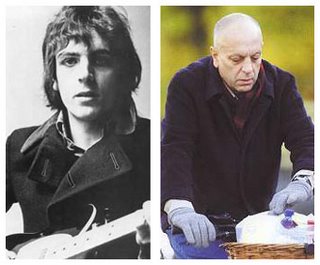 Pink Floyd has lost its "crazy diamond."
Pink Floyd has lost its "crazy diamond."Syd Barrett, the brilliant, erratic catalyst for Floyd's early success, "died peacefully at home". He was 60 years old. The musician had been in ill health for years, battling diabetes, as well as stomach ulcers.
A singer and guitarist, and originally the band's principal songwriter, Barrett masterminded Pink Floyd's breakthrough album, Pipers at the Gates of Dawn, before being sidelined in the late 1960s by behavioral problems.
Barrett teamed with bassist Roger Waters, drummer Nick Mason and keyboardist Richard Wright to launch Floyd in 1965, deriving the name from two bluesmen, Pink Anderson and Floyd Council.
Barrett fronted the band during its initial rise to fame, culminating with the 1967 classic The Piper at the Gates of Dawn, which mixed jazz, rock and R&B with psychedelia--a template for the prog-rock sound the band refined in its 1970s heyday--and propelled Floyd to stardom.
But Barrett couldn't enjoy the band's triumphs. He began to suffer from increasingly severe mental problems brought on by his heavy use of LSD and mood-altering drugs, frequently faltering during concerts.
In January 1968, his Floyd mates invited friend and fellow guitarist-vocalist David Gilmour to take over playing Barrett's parts during live shows, but with the understanding that Barrett would continue writing and recording songs.
Ultimately though, as Barrett grew increasingly unpredictable and his musical output dwindled, he was booted from the band. Only one track he wrote, "Jugband Blues," made it onto Floyd's second album, 1968's A Saucerful of Secrets.
There has been much speculation concerning the psychological well-being of Syd Barrett. Many believe he suffered from schizophrenia, though he didn't totally fit the typical profile for that condition. Additionally, some have suggested that Barrett had traits associated with Asperger Syndrome, a condition similar to autism.
Barrett's use of LSD during the 1960s is well-documented. Some believe that Barrett's drug use helped trigger or contribute to his mental illness. In an article published in 2006, Gilmour was quoted as saying: "In my opinion, his breakdown would have happened anyway."
With Waters assuming band leadership, Floyd cemented its legendary status with a string of masterpieces, including 1973's Dark Side of the Moon, the 1975 tribute to Barrett, Wish You Were Here, which featured the epic track "Shine On You Crazy Diamond," and 1979's The Wall.
The post-Barrett Pink Floyd sold over 200 million albums and became one of the most mesmerizing live acts in music history. The band, Barrett included, was inducted in the Rock and Roll Hall of Fame in 1996.
He was born Roger Keith Barrett, on Jan. 6, 1946 in Cambridge, England, the youngest of five children of a pathologist and his wife. Barrett studied music when he was a boy at the behest of his parents and acquired the nicknam, "Syd" as a nod to a local Cambridge musician named Sid Barrett.
After leaving Pink Floyd, Barrett recorded two solo albums, The Madcap Laughs and Barrett, both of which failed commercially. He subsequently exited the music industry altogether and became a recluse, spending the rest of his life living with his mother.
Barrett shocked his former band mates by paying them a surprise visit during recording sessions for Wish You Were Here.
According to Nick Mason it was a sad reunion--Barrett had become virtually unrecognizable to the band, having gained weight and shaved his head and eyebrows. Barrett had also taken to randomly brushing his teeth and jumping up and down in place. The sight so upset Waters that he nearly broke down.
"Roger was in tears, I think I was; we were both in tears," Wright once told VH1. "It was very shocking...seven years of no contact and then to walk in while we're actually doing that particular track "Shine on You Crazy Diamond". I don't know--coincidence, karma, fate, who knows? But it was very, very, very powerful."
Many artists have acknowledged Barrett's influence on their work: Paul McCartney, Pete Townshend, Jimmy Page, David Bowie, Brian Eno, The Damned, Soft Machine, R.E.M., Soundgarden, Placebo, Lost and Profound, The Smashing Pumpkins, Phish, Marc Bolan, The Jesus and Mary Chain, The Cure, Dirty Pretty Things, Robyn Hitchcock, The Flaming Lips, Pearl Jam, Transatlantic, Dream Theater, and the Red Hot Chili Peppers.
Johnny Depp has shown an interest in a biographical film based on Barrett's life.
Syd - wish you were here.

I'd pay to see the Johnny Depp Syd Barrett biopic. So long as Oliver Stone says "no thank you" to directing it.
ReplyDeleteNot that I don't like "The Doors", but he's a little too heavy handed and Syd hardly needs that treatment.
But from what I understand, won't his post-Floyd life make somewhat tedious watching, if not downright difficult?
Thanks for writing this up so well.
I agree but I think the most obvious choice for director would be the guy who's already successfully directed Johnny Depp five times....... Tim Burton.
ReplyDelete